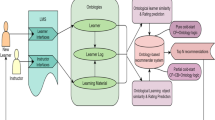Abstract
Recommender systems provide strategies that help users search or make decisions within the overwhelming information spaces nowadays. They have played an important role in various areas such as e-commerce and e-learning. In this paper, we propose a hybrid recommendation strategy of content-based and knowledge-based methods that are flexible for any field to apply. By analyzing the past rating records of every user, the system learns the user’s preferences. After acquiring users’ preferences, the semantic search-and-discovery procedure takes place starting from a highly rated item. For every found item, the system evaluates the Interest Intensity indicating to what degree the user might like it. Recommender systems train a personalized estimating module using a genetic algorithm for each user, and the personalized estimating model helps improve the precision of the estimated scores. With the recommendation strategies and personalization strategies, users may have better recommendations that are closer to their preferences. In the latter part of this paper, a real-world case, a movie-recommender system adopting proposed recommendation strategies, is implemented.















Similar content being viewed by others
References
Konstan, J., Miller, B., Maltz, D., Herlocker, J., Gordon, L. & J. Riedl, GroupLens: Applying collaborative filtering to usenet news. Communications.
Anyanwu, K., & Sheth, A. (2003). \(\rho \)-Queries: Enabling querying for semantic associations on semantic web. In Proceedings of the 13th international world wide web conference, pp. 117–127.
Swets, J. A. (1963). Information retrieval systems. Science, 141, 245–250.
Swets, J. A. (1969). Effectiveness of information retrieval methods. American Documentation, 20, 72–89.
Protégé a free, open source ontology editor and knowledge-based framework, was developed by the Stanford Center for Biomedical Informatics Research at the Stanford University School of Medicine. http://protege.stanford.edu.
Blanco-Fernandez, Y., et al. (2008). A flexible semantic inference methodology to reason about user preferences in knowledge-based recommender systems. In Knowledge-based systems, pp. 305–320.
Sarwar, B. M., Karypis, G., Konstan, J. A., & Riedl, J. (2001). Item-based collaborative filtering recommendation algorithms. In Proceedings of the 10th international world wide web conference (WWW10).
Burke, R. (2002). Hybrid recommender systems: Survey and experiments. In User modeling and user-adapted interaction, pp. 331–370.
Balabanovic, M., & Shoham, Y. (1997). Fab: Content-based, collaborative recommendation. Communications of the ACM, 40(3), 66–72.
Gruber, T. R. (1993 March). Toward principles for the design of ontologies used for knowledge sharing, International workshop on formal ontology. Padova.
Aleman-Meza, B., Halaschek-Wiener, C., Arpinar, I. B., Ramakrishnan, C. & Sheth, A. (2005 May/June). Ranking complex relationships on the semantic web. IEEE Internet Computing, 9(3).
Ganesan, P., Garcia-Molina, H., & Widom, J. (2003). Exploiting hierarchical domain structure to compute similarity, ACM Transactions on Information Systems, 64–93.
Breese, J. S., Heckerman, D. & Kadie, C. (1998). Empirical analysis of predictive algorithms for collaborative filtering. In Proceedings of the fourteenth annual conference on uncertainty in, Artificial Intelligence (UAI-98), pp. 43–52.
Sarwar, B. M., Konstan, J. A., Borchers, A., Herlocker, J., Miller, B., & Riedl, J. (1998). Using Filtering agents to improve prediction quality in the groupLens research collaborative filtering system, computer supported cooperative, work.
Tang, J., Liang, B. Y., & Li, J. Z. (SeC 2005). Toward detecting mapping strategies for ontology interoperability. The Semantic Computing Initiative.
Jena: A semantic web framework for java, http://jena.sourceforge.net/.
SPARQL query language for RDF http://www.w3.org/TR/rdf-sparql-query/.
Cantador, I., Bellogín, A., & Castells, P. (2008). A multilayer ontology-based hybrid recommendation model. AI Communications, 21, 203–210.
Burke, R. (2000). Knowledge-based recommender systems. Encyclopedia of Library and Information Systems, 69(32).
Ali, A. D., El Emary, I. M. M. & Abd El-Kareem, M. M. (2009 September). Application of genetic algorithm in solving linear equation systems. MASAUM Journal of Basic and Applied Science, 1(2).
OWL Web Ontology Language, http://www.w3.org/TR/owl-features/.
IMDb, the Internet Movie Database. http://www.imdb.com.
Netflix, the largest subscription service streaming movies over the Internet and sending DVDs by mail in North America. http://www.netflix.com.
Herlocker, J. L., Konstan, J. A., Terveen, L. G., & Riedl, J. T. (2004). Evaluating collaborative filtering recommender systems. ACM Transactions on Information Systems, 22(1), 5–53.
Schafer, J. B., Contact Information, Joseph, A. (2010). Konstan contact information and John Riedl. E-commerce recommendation applications, data mining and knowledge discovery, pp. 115–153.
The Semantic Web, http://semanticweb.org/wiki/Main_Page.
Yazidi, A., Granmo, O.-C., Oommen, B. J., Gerdes, M., & Reichert, F. (2011). A user-centric approach for personalized service provisioning in pervasive environments. Wireless Personal Communications, 61(3), 543–566.
Leu, J.-S., Changfan, C., Su, K.-W., & Chen, C.-F. (2012). Design and implementation of a fixed-mobile convergent music search engine (FMC-MUSE). Online First: Wireless Personal Communications. .
Author information
Authors and Affiliations
Corresponding author
Rights and permissions
About this article
Cite this article
Cheng, ST., Chou, CL. & Horng, GJ. The Adaptive Ontology-Based Personalized Recommender System. Wireless Pers Commun 72, 1801–1826 (2013). https://doi.org/10.1007/s11277-013-1097-9
Published:
Issue Date:
DOI: https://doi.org/10.1007/s11277-013-1097-9




